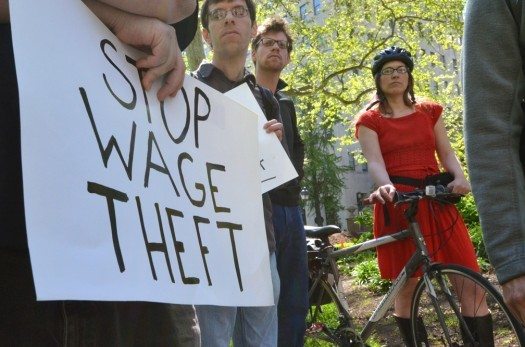Labor & Economy
Lien In: New California Bill Seeks to Curb Wage Theft

The gaudy evidence of income inequality is all around us: stratospheric CEO “wages,” private plane shuttles to Coachella, gated enclaves and all the rest. But few things say “class war” more eloquently than wage theft, the practice by unscrupulous businesses of short-changing their employees by undercounting work hours or shaving off time for breaks that were never taken.
Wage theft is probably about a minute older than ancient history’s first labor handshake and partly exists because most workers who suffer it are too financially insecure to complain. Now, however, there is increasing pushback from some city and state governments, and from workers themselves –McDonald’s low-wage employees have filed class action lawsuits in several states to recover wages they allege were gouged from their paychecks.
In California, Assembly Bill 2416 (“California Wage Theft Prevention Act”), introduced by Mark Stone (D-Monterey Bay), seeks to curb wage theft by allowing workers to file liens against the real and business property of employers they claim owe them wages. Under the state’s Civil Code, that right already exists for some workers – Stone’s bill would expand the range of employees who can do this to include any worker.
Property liens are seen as especially effective in recovering stolen wages that are seldom paid through conventional suits. According to the Koreatown Immigrant Workers Alliance, even when workers win judgments in cases brought before the state Labor Commission, “the vast majority . . . never collect even one penny of their judgment. . . . And many more feel forced to settle for pennies on the dollar, knowing their hope of recovering their pay is dismal.”
AB 2416 has gotten the attention of the state’s Chamber of Commerce, which has placed the bill on its list of “job killers,” a tactic that has proved remarkably effective in stopping pro-worker legislation. How Assemblyman Stone’s bill will fare remains to be seen – at the moment it rests with the Labor and Employment Committee, where it is scheduled to be taken up this week. Versions of Stone’s bill have been proposed before, only to be shot down or die in legislative committee. Just a few months ago a similar bill, Bonnie Lowenthal’s (D-Long Beach) AB 1164, was placed on the permanently inactive file.
Besides the CalChamber, the state’s Farm Bureau and Business Roundtable have fought attempts to use property liens to recover stolen wages, claiming they “cripple” business, but none of the business lobbies lining up against Stone’s measure acknowledge the ruinous effect that wage theft has on the lives of low-income workers.
“Thieves caught stealing thousands of dollars from someone’s home can go to jail,” the Washington Post’s Catherine Rampell recently wrote. “The same should be true for thieves caught stealing thousands of dollars from someone’s paycheck.”
A “capital” idea to be sure, although for now California workers will settle for simply getting paid the wages promised them.
Photo: ROC United

-

 The SlickJanuary 23, 2026
The SlickJanuary 23, 2026Yes, the Energy Transition Is Coming. But ‘Probably Not’ in Our Lifetime.
-

 The SlickJanuary 27, 2026
The SlickJanuary 27, 2026The One Big Beautiful Prediction: The Energy Transition Is Still Alive
-

 Column - State of InequalityJanuary 29, 2026
Column - State of InequalityJanuary 29, 2026Are California’s Billionaires Crying Wolf?
-

 Latest NewsFebruary 3, 2026
Latest NewsFebruary 3, 2026Amid the Violent Minnesota Raids, ICE Arrests Over 100 Refugees, Ships Many to Texas
-

 Dirty MoneyJanuary 30, 2026
Dirty MoneyJanuary 30, 2026Amid Climate Crisis, Insurers’ Increased Use of AI Raises Concern For Policyholders
-

 Featured VideoFebruary 4, 2026
Featured VideoFebruary 4, 2026Protesters Turn to Economic Disruption to Fight ICE
-

 The SlickFebruary 2, 2026
The SlickFebruary 2, 2026Colorado May Ask Big Oil to Leave Millions of Dollars in the Ground
-

 Column - State of InequalityFebruary 5, 2026
Column - State of InequalityFebruary 5, 2026Lawsuits Push Back on Trump’s Attack on Child Care

